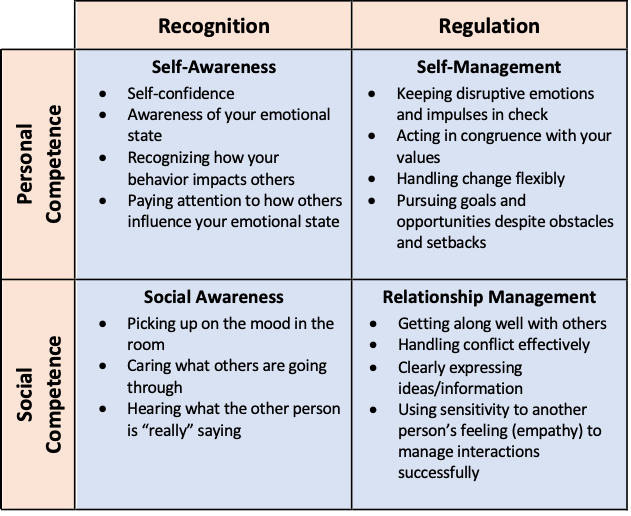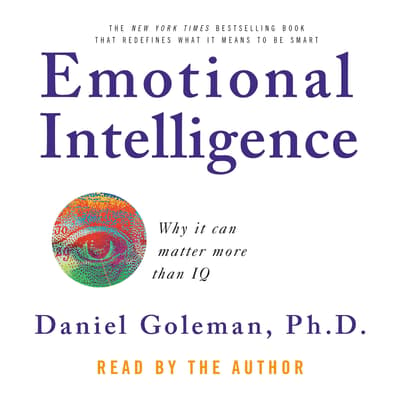Imagine this: you’re in a heated work meeting. A colleague throws a verbal jab your way. The room suddenly feels charged, and your heart starts pounding. How do you react? Do you snap back, escalating the tension? Or do you take a breath, choose your words carefully, and steer the conversation back to a productive outcome? This is just one example of how emotional intelligence, or EQ, plays a crucial role in our everyday lives. But it’s not just about managing difficult situations. It’s about truly understanding ourselves and others, building meaningful connections, and achieving our full potential.

Image: kiturt.com
Daniel Goleman’s groundbreaking book, “Emotional Intelligence,” has been a cornerstone for understanding and developing this vital skill. It brought the concept of EQ into the mainstream, showing how it can be more important than traditional IQ for success in personal and professional life. In this article, we’ll dive into the world of emotional intelligence, uncovering its significance, exploring its key components, and showing how Goleman’s insights can help you unlock your own emotional superpowers.
The Birth of Emotional Intelligence
The concept of emotional intelligence wasn’t always mainstream. Back in the 1980s, most people focused on IQ, believing it was the sole determinant of success. But a growing number of researchers, including Peter Salovey and John Mayer, were beginning to see a different picture. They coined the term “emotional intelligence” in 1990, outlining a distinct set of skills that involved understanding, managing, and harnessing emotions.
Then came Daniel Goleman, a renowned psychologist and science journalist, who took the concept to new heights. His 1995 book, “Emotional Intelligence,” exploded onto the scene, becoming a global bestseller. It helped popularize the idea that EQ could be just as important, if not more, than IQ for navigating life effectively.
Unpacking the Pillars of EQ
While the term “emotional intelligence” can sound complex, at its core, it’s about mastering five key pillars:
- Self-Awareness: The ability to recognize your own emotions, strengths, weaknesses, and their impact on others. It’s about knowing your triggers, understanding what motivates you, and building self-confidence.
- Self-Regulation: The capability to manage your emotions constructively, staying calm under pressure, and responding thoughtfully instead of impulsively. Think about it: how often do you let your emotions control your actions?
- Motivation: The drive and passion that fuels your goals and inspires you to push forward even in the face of setbacks. You’ve probably seen examples of this in your own life – people who seem to have an unyielding determination to achieve their dreams.
- Empathy: The capacity to understand and share the feelings of others, building genuine connections based on compassion and perspective-taking. This is crucial for fostering strong relationships, building trust, and collaborating effectively.
- Social Skills: The ability to communicate effectively, build rapport, negotiate skillfully, and manage conflicts constructively. This includes active listening, expressing your thoughts and feelings clearly, and adapting your communication style to different situations.
Goleman’s Blueprint for EQ Success
Goleman’s book isn’t just a theoretical exploration – it provides a practical framework for enhancing your emotional intelligence. He offers a wealth of insights and actionable tips, making the concept accessible and useful for anyone seeking to improve their emotional skills.
Here are some key takeaways from “Emotional Intelligence”:
- Recognize and Manage Your Emotional Triggers: Everyone has triggers – moments that evoke strong emotions. Goleman emphasizes the importance of identifying these triggers and developing healthy coping mechanisms. This might involve taking a break, practicing mindfulness, or seeking support from others.
- Master the Art of Self-Regulation: Managing your emotions is an ongoing practice, not an overnight switch. Goleman suggests techniques like deep breathing, mindfulness meditation, and journaling to help you gain control over your emotional responses.
- Embrace Empathy as a Superpower: Empathy is the foundation for strong relationships. It allows us to connect with others on a deeper level, understand their perspectives, and build trust. Goleman encourages developing this skill by actively listening to others, asking open-ended questions, and truly trying to see things from their point of view.
- Cultivate Social Skills for Effective Communication: Clear, concise, and empathetic communication is essential for building strong relationships and achieving goals. Goleman stresses the importance of active listening, expressing your thoughts and emotions constructively, and adapting your communication style to different contexts.

Image: www.downpour.com
Putting Goleman’s Insights to Work
While recognizing and developing EQ is a personal journey, here are a few practical tips inspired by Goleman’s work that you can start applying today:
- Pay Attention to Your Emotional Landscape: Take a few minutes each day to check in with your emotions. Ask yourself: “What am I feeling right now? What triggered this feeling?” This simple practice helps you become more aware of your emotional patterns.
- Practice Mindfulness and Self-Reflection: Mindfulness encourages you to focus on the present moment, accepting your thoughts and feelings without judgment. Engage in activities like meditation, journaling, or mindful breathing to cultivate a greater sense of awareness and emotional regulation.
- Embrace Empathy in Your Interactions: Try to see things from other people’s perspectives. Ask yourself: “How might this person be feeling?” actively listening and seeking to understand their experiences.
- Learn to Communicate Effectively: Develop your communication skills by practicing active listening, expressing your thoughts clearly, and adapting to different communication styles.
Emotional Intelligence By Daniel Goleman Pdf
The Emotional Intelligence Advantage
Emotional intelligence is not a one-size-fits-all solution. It’s a dynamic process of continuous growth. But the rewards for those committed to developing their EQ are considerable. Whether you’re striving for greater personal satisfaction, professional achievement, or simply more fulfilling relationships, understanding and harnessing your emotional intelligence can unlock a world of possibilities.
So, are you ready to unlock your own emotional superpowers? Dive into Daniel Goleman’s “Emotional Intelligence.” It’s a journey that can change your life, one emotion at a time.





